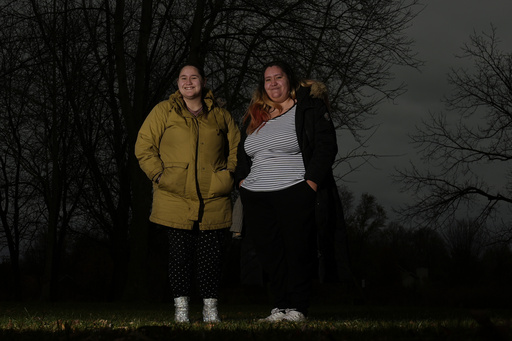
In the aftermath of the presidential election, 19-year-old Sadie Perez has started carrying pepper spray around her college campus for personal protection. Additionally, her mother purchased a self-defense kit for both her and her sister, which includes various tools such as keychain spikes, a concealed knife, and a personal alarm. This precautionary move is a direct response to a surge in menacing behavior from a segment of right-wing influencers who have taken to the digital world to amplify their misogynistic sentiments following Donald Trump’s election victory. They have co-opted a slogan from the 1960s abortion rights movement, twisting it to assert “Your body, my choice” toward women both online and in educational institutions.
The implications of this rhetoric have left many women feeling alarmed, particularly as some men interpret the election outcome as a setback for women’s rights and reproductive autonomy. “It’s unfortunate that I feel I need to carry pepper spray like this,” Perez commented. “Women should feel entitled to safety and security.”
Isabelle Frances-Wright, who oversees technology and society initiatives at a think tank dedicated to studying polarization and extremist behavior, noted a significant rise in various forms of misogynistic language following the election, including some that are alarmingly violent. She remarked that the rapid and aggressive spread of this rhetoric has taken many progressive women by surprise.
The phrase “Your body, my choice” initially gained traction through a post from Nick Fuentes, a known white nationalist and Holocaust denier who has made headlines for associating with Trump. Despite Trump’s past claims of ignorance regarding Fuentes, the slogan quickly gained massive attention, garnering 35 million views within a day of its posting, as Frances-Wright’s organization reported. This phrase has permeated social media, resulting in its frequent appearance in comment sections on TikTok and even being chanted by students in schools and on college campuses. Reports indicate that one mother’s daughter encountered the phrase multiple times while on her campus.
In response, school districts in states like Wisconsin and Minnesota have alerted parents about the increased usage of this language. Moreover, items adorned with the phrase were removed from online retail platforms like Amazon. Perez has noticed that some men have started to respond to shared academic-related content with this slogan, leaving her feeling “disgusted and encroached upon,” as she lamented, “It feels like we’re regressing.”
While misogynistic sentiments have existed on social media for years, Frances-Wright and others monitoring extremism indicate that the post-election period has seen an alarming increase in rhetoric encouraging violence against women or celebrating potential setbacks in women’s rights. Comments urging women to “get back in the kitchen” or calling to “repeal the 19th” Amendment, which secured women’s voting rights, have gained significant traction. The ten most prominent posts advocating for the repeal of the 19th Amendment collectively received over four million views shortly after the election, highlighting the virulence of this movement.
Recent incidents have illustrated the dire consequences of this rhetoric; for instance, a man displaying a sign stating “Women Are Property” on a university campus ignited significant backlash, prompting the administration to explore legal actions. Furthermore, many women posting critiques about the election results faced anonymous rape threats on platforms like TikTok. In extreme online corners, forums such as 4chan have discussed forming “rape squads” and adopting themes from “The Handmaid’s Tale,” a fictional narrative exploring the subjugation of women.
Frances-Wright emphasized the troubling nature of how swiftly these threats have translated into real-world scenarios, noting that online dialogue often carries tangible consequences. Previous violent trends visible on forums like 4chan have been linked to racially motivated attacks, as seen in tragic events like the mass shooting in Buffalo, and remarks linking the COVID-19 pandemic to Asian communities have resulted in increased hate incidents.
The Global Project Against Hate and Extremism has documented a surge in violent misogynistic trends finding footholds on right-wing platforms such as 4chan and spreading into more conventional social media spaces after the election. Throughout Trump’s campaign, efforts were made to engage younger disaffected men through conservative podcasts and messages. His appearance at the Republican National Convention was notably accompanied by James Brown’s song “It’s A Man’s Man’s Man’s World,” highlighting a concerted effort to appeal to traditional masculine ideals.
As reported by a nationwide voter survey, Trump managed to increase his support among younger males during the election, further claiming a notable percentage of women’s votes from the 18 to 44 age group. Many men view his reelection as a validation of their feelings of disempowerment, while many women interpret the election results as a blow to their rights, especially given the unfavorable outcome for Vice President Kamala Harris.
Gender and political specialists note that some men feel a sense of loss in societal standing and associate Trump’s victory with a chance to restore traditional gender dynamics. Although the current wave of rhetoric lacks direct promotion from Trump or his close associates, it emerges in the backdrop of his long-standing history of derogatory remarks towards women alongside his campaign, which emphasized a masculine identity and frequently targeted Harris based on her race and gender.
As Dana Brown, the executive director of a center focusing on women’s political issues, explained, many young men perceive a sense of victimhood stemming from societal shifts shaped by the women’s rights movement and factors like the #MeToo movement, often accompanying economic frustrations. The increasing presence of women in both academia and professional sectors leads some young men to scapegoat women for their own struggles in college admissions, shunning personal introspection.
Perez mentioned that she and her sister have relied heavily on their support networks, text-checking each other for safety and organizing outings to celebrate victories such as a female-dominated student government at their college. “I want to motivate my peers and the women I care about to voice their opposition to this rhetoric and not let fear dominate their lives,” she remarked.
